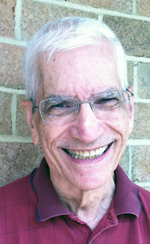By Joel H. Cohen

NEW YORK — Not that we Jews have an exclusive on the practice, but our comebacks and punchlines can lighten the mood of a wide range of subjects, from secular to sacred.
Some examples:
To get a coveted location at a Manhattan establishment, a Jewish friend, a longtime garment industry employee, introduced himself as “Doctor.”
He and his party were seated at the desired location, and all went well until a man at the next table had a seizure and a woman called frantically to our friend, “Doctor, doctor.”
Our friend held up his hand and amended his title: “PhD”; he said, “PhD.”
Luckily the seizure victim survived.
A comment can reflect a celebration of life, as when, at the trade paper where she and I were employed, a woman fashion reporter stood up one day and, amid the clatter of typewriters and the hum of conversation, declared: “When you’re in love, the whole world is Jewish …”
Then she sat down, and the workplace clamor resumed.
The subject can have an impact on something as mundane as soup. Schav is a cold green soup made from a leafy green vegetable called sorrel. It involves an acquired taste for some people, me among them.
So, when I saw it on the menu of the luncheonette that a few fellow workers and I frequented, I ordered a bowl.
“We don’t have it today,” the waitress said, to which I, quick on the uptake, replied,” Oh, you, have it only some days?”
“No, we never have it,” she said.
“Then why is it on the menu?” I asked.
“Some people like it,” she answered.
Among those who apparently did, an editor at Reader’s Digest bought the anecdote from me.
Jewish remarks have impact overseas, too.
An Israeli asks an American visitor if he’d like to see the Tomb of the Israeli Unknown Soldier. “Very much,” says his guest, and the next morning they set out to a beautiful cemetery, where inscribed on a monument are the words: “Izzie Schwartz, Tailor.”
“I thought you were taking me to the Tomb of the Unknown Soldier.
“I did. This is it. As a solider, he was unknown, But, as a tailor, hoo hah!
And at home …Years back, my old shul – Agudath Achim Anshe Chesed (which I speculated embodies all the names suggested by the committee). We used to abbreviate it as “Triple-A. “
And one day, driving to an event in the Boston area, we had two passengers with us, sisters-in-law to each other. One was a member of our shul, the other lived out of town. When she asked, “Where do you usually get your yahrtzeit notices?” the others replied, “Triple A.”
“Oh … The automobile club’s sending them out?
“Only to premium members.”
That exchange happened years ago. Earlier, at a time when Decembers were traditional Decembers — snowy, bone-chilling, nasty – several of us were saying Kaddish for our respective parents. On one December day, a fellow saying Kaddish for his mother stood up in the middle of the service, and declared, “My mother wouldn’t want me out on a day like today,” and sat down to the amusement of fellow congregants.
At home, I told my wife and oldest son, then about 6, about the amusing thing that had had transpired.
My son looked at me and said, earnestly: “Don’t worry, Dad. When you die, I won’t go out in weather like this. I’ll get Uncle Bud to say the prayer.”
Could you want any better reassurance?
To sum up, another story …
Two old friends are sipping tea, when one says to the others: “You know, life is like a glass of tea.’
“That’s interesting” says the other. “In what way?”
“How do I know? Am I a philosopher?
*
Joel H. Cohen is a freelance writer based in New York.